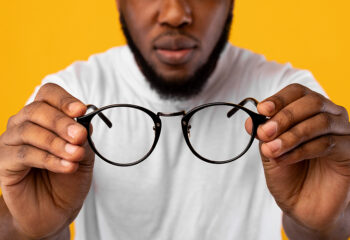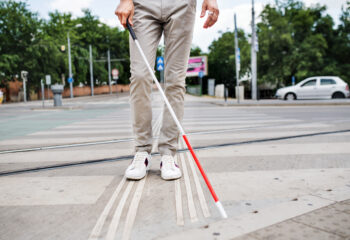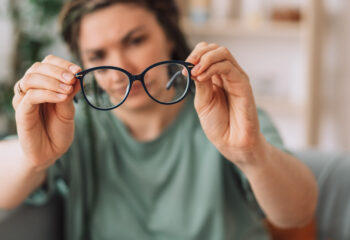
toward camera and smiles
2023 Letter from the Editor
It’s 2023, happy new year. The number boggles my mind, for so many reasons. Since 2020, it seems we have been living in an altered universe. Although the hope was life would eventually return to normal post-pandemic, deep down we knew things might never be the same. A stark reminder that you don’t know what you have until it’s gone. The lost sense of normalcy and need to accept and adjust felt oddly familiar to life with vision loss
As age 65 approaches, I am compelled to look back, 33 years, to the start of a life changed by progressive vision loss. Having known only 20/20 vision to that point, it was hard to understand what was to come. The questions far outweighed the answers. I feared total blindness as I was simultaneously encouraged to believe there would be a cure in the next 10 to 15 years. Three decades later, neither cure nor blindness has become a reality.
Although my vision qualified as “legal blindness” 20 years ago, the terminology is misleading. My visual acuity has not been recorded with numbers for a very long time; instead my eyesight is reduced to absurd classifications such as: counting fingers and waving hands. This deceptive language insults my intelligence and my eyesight. At the very same eye exam, when I say I cannot read the forms they are handing me on a clipboard, they say, Oh, you don’t look visually impaired.” I reply, “Yes, I do, this is what visually impaired looks like.”
The fact is, I am still able to type this article into a computer and see the words magnified on screen. I have never stopped working or felt the need to declare myself disabled. The fears I felt early on did not come to fruition. My life was changed, but not interrupted or devastated. It would be more accurate to say, it has given me purpose. By sharing my experience, I hope to convey a better understanding for everyone touched directly, or indirectly, by vision loss.
Communication on this topic is anything but clear. The OE post titled, Surprises Contained in the White Cane, brought up a pervasive ignorance about the cane. We heard from too many visually impaired cane users being called out, in public, for faking blindness. Some have been accused of faking sightedness because they do not use a cane. I tell someone I have not seen in several years about my recent adoption of the white cane; they ask, “Can you see anything? Do you have light perception?”
Skewed perceptions perpetuate stigma. As I said in the white cane article, “It’s a conundrum, of poor public awareness caused by inaccurate terminology, and a correction is long overdue. Vision loss is a spectrum, and that deserves a better understanding.” Let’s not make it any more difficult than it has to be.







